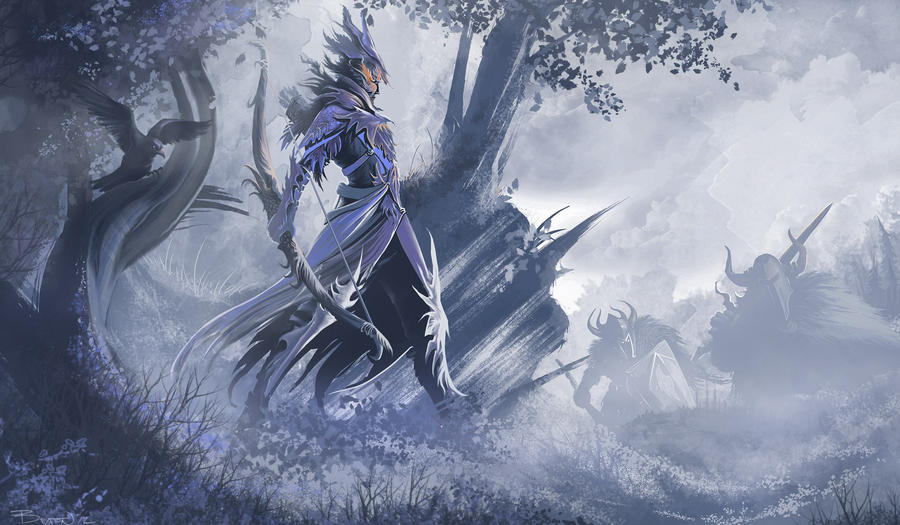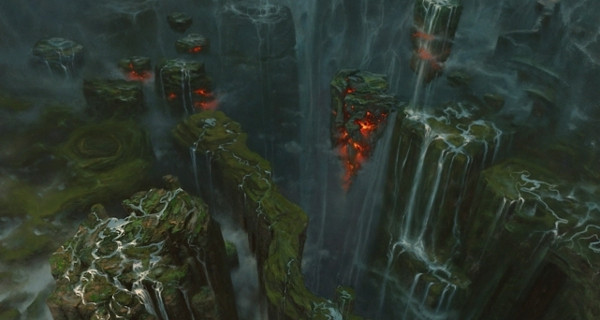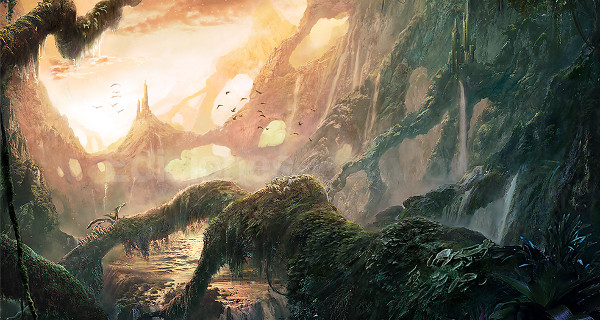There are a few D&D classes I always rant about. Basically all the "not-big-4" classes. That is, everything that is not Fighter, Cleric, Wizard, or Rogue.
The idea that all other classes should be derived from these is a common "political alignment" in the D&D community, and it's a nasty confusion in and by itself. Because one thing is saying that classes should all be classifiable in those 4 big groups, which would make it easy, for example to have mechanics such as feats or things such as magic items apply to whole groups of classes, like all spellcasters, all scoundrel etc; another thing is to say all classes are technically a combination of those 4, and at that point can very well be sub-classes. You know, I agree: if they are a combination of features from those 4, definitely make them subclasses. Or even more rationally, (p)re-packaged multiclass characters, for those that really don't like to manually multiclass.
The big problem is very simple: all of this comes out of one seldom-recognized mistake: wanting to recreate the "hybrid classes", such as the Ranger, in every edition so that they resemble the first incarnation of the class. You might say "But it's tradition of the game, it's a classic". And I say: "Sure, the Ranger is a tradition and a classic. But is its class advancement table also that??".
My point is that for a class to respect its own tradition and classicism (pun not intended), the mechanics need not to be the same.
 |
| Ranger by BBeaton |
The Fallacy of the "Hybrid Classes".
The big problem, regarding those original mechanics of what I and some people refer to as hybrid classes, is exactly that they were born as hybrids.
The game was still new, they had a few working blocks, they didn't want to risk balance by making up completely new stuff: they took the working blocks, mixed them together removing something here and there to justify the increase of total available features, adding as little new things as possible so as to not break anything, and voilá, there's your new snappy class, the Ranger.
Now, why the hell should the result of a (justified by the times) lack of understanding of the game system (that is, the creation of classes as hybrids instead of from scratch, to avoid unknown issues), become a tradition in the game?
I'll tell you why. Because players have never seen anything else. So a lot of people, when they think Ranger, they picture exactly a fighter-like table with a small 1 to 4 spell level casting table on the side. Half Fighter, half Cleric. Or Druid, better. Why? Just because that's the mechanical representation they have always seen. They might say "But at 4th level it gets the animal companion, and from first level the whole favored enemy thing, and a fighting style.". Yeah. Apart from the animal companion, the other two are either marginal, not-game-changing things (favored enemy in its classic implementation), or emulated features from some other class as well. (fighting style). I could argue even the animal companion is nothing but a simulation of a summoned creature spell, just more permanent but less powerful.
See? All construction blocks from other classes, put together. But why having multiclassing or sub-classes then? Of course some will then say it can very well be a Fighter subclass. Makes sense.
And something they never ask themselves though, is how does playing this combination differ from actually playing... The combination of separate things? It's just the same, only in one ready package instead of picking stuff.
The fact is, nobody ever thought about making a Ranger that doesn't borrow ANYTHING from ANY OTHER CLASS.
A Ranger that is just Ranger, doing things nobody else can do.
Of course, I think the same of every single class, but case study now is Ranger.
So what should it be to be a thing of its own?
The Ranger's Soul, the starting point.
I often refer to "souls" of classes. The combination of base mechanical concepts, and base thematic concepts behind them. The lack of understanding, or focusing, on the classes' souls, is the source of all the debates in the community about classes that shouldn't exist, or not as standalone, or not as subclass of this but of that, and so on.
In a sentence: any class that doesn't have a clearly defined "soul", different and not overlapping with any other class' "soul", is not worth having as stand-alone class.
Why? Because multiclassing. D&D has always allowed multiclassing, and even if a few DMs don't allow it for (personally not understandable) reasons, the game system should be at least recognizing the possibility. So that if you want to play a character that truly mixes things from two or more different mechanic/thematic spheres, it needs to be multiclass, or he/she needs to tone down the concept and maybe resort to re-flavoring existing classes, if multiclassing is not allowed.
So it's very simple: a class should contain a certain quantity of inseparable and unique mechanical and thematic concept that will be unique to that class. Like primary colors: you can't obtain them by mixing others. Classes should be the game system's primary colors. You can mix them and obtain something else, sure, but since we're not talking visible light spectrum, they can be many more than the real word primary colors.
So one thing to take in mind when defining the Ranger's Soul is to not overlap (or at least not sensibly) with the souls of similar classes.
This would require defining the souls of the similar classes, but I would cut a bit of that, since they mostly are quite clear to the average player, and directly state what the Ranger's Soul should be, according to tradition and the concepts behind the class.
A Ranger is a warrior and an expert focused on the knowledge of terrain, hunting strategies, and knowledge of their prey, capable of specialized strategies unknown to regular fighters which may change the course of a battle if the circumstances are right. In addition, the Ranger is capable of using a minor form of nature magic to actually facilitate or create those circumstances, and in some cases even aid directly in combat.
Now, you should recognize that things such as favored enemy (or terrain), fighting style, animal companion, and spells, all fall into this description. The point is, they become the true tools of the ranger instead of just additions and sprinkles of flavoring on top.
So how would I make them?
The Way of the Ranger: Strategy instead of Tactics.
Combat-wise, the thing that should set the Ranger apart is the focus on more long-term aspects compared to the Fighter round-per-round decisions if using a powerful attack, an accurate one or other maneuvers. The Ranger is more about planning the battle so that whatever round-per-round situation occurs, he will have an advantage against the enemy. Strategy instead of tactics.
The Ranger can specialize in different strategies, possibly tied tot heir favored enemies and terrain. Fighting in a forest for example involves moving a lot and take advantage of the cover of trees. Fighting against hordes of enemies is about reflexes and speed of reaction against multiple threats, instead of focusing on taking down a big beast, which instead requires more perception of weak spots and a way of evading deadly attacks coming from basically only one direction. In this, D&D Next made a big step forward, by separating the mechanics of the favored enemy from the specific enemy itself, making them useful for broader situations.
But basically, the typical Ranger Fighting Style + Favored Enemy/Terrain features should grant some conditional boosts that encourage a certain way of fighting, during the entire encounter. The Ranger wants to fight in one way. Different Rangers have different ways, but it's always about one general way (maybe learning a few more with levels). It differs from the Fighter, which is more generalist and focuses on always having the needed tools for each given situation, but without any strategical advantage for any specific condition.
So you might say, the Ranger depends too much on conditions. Yes and no. Yes, he/she's better in certain conditions, no he/she doesn't need them to just be there, he/she can actually set them up or even create them.
How? Two ways.
Nature Magic and Animal Companion.
These two could coexist or a Ranger could favor one instead of the other. Doesn't matter much. What matters is their function and working.
Basically, a Ranger being a strategy-focused warrior, he needs for his specialized strategies to work even in conditions when they wouldn't. The Animal Companion, depending on the type, could provide exactly what's needed. A "tactical anvil" to put on one side of the enemy why you "hammer" the opposite side, a distraction to cover your steps or to keep the enemy at a distance, a stealthy threat to ambush, a venomous threat to make the enemy less efficient in some areas, slow them down, and so on.
Just as well, the subtle nature magic that would make the Ranger different from just "using a couple of Druid spells", would be mostly out-of-combat to set up traps, terrain conditions, acquire vital information on the enemy, cure, boost some fighting capabilities and so on. It should be the pre-battle preparation of the Ranger, so some kind of Ritual-only magic. To which some minor but very quickly casted spells could be added in battle, things such as sudden speed boosts, either of attack or true movement, a magical cover to aid stealth temporarily, and also some combat magic, focused on the weapon the Ranger carries, being either "bow magic" or "blade magic", and drawing a lot from nature.
And being tied to nature and the Ranger's expertise, given the right amount of time, a Ranger should never run out of pre-combat preparation magic, and given the right amount of "harmony with the environment"; that I would envision mechanically as how much the Ranger actually makes its strategic focus work, for example managing to keep the enemy far if it's a bow-focused Ranger, or managing to hit multiple enemies if we're talking specialization against hordes. These triggers could basically recharge the quick spellcasting of the Ranger. I could even see the Ranger spellcasting as being a mental focus thing. You either have the mental focus (and thus can use it to cast one of those specific spells) or you don't, and you have to acquire it. Something as simple as running around the battlefield could give the Ranger the needed focus or "harmony with the environment" to cast a minor spell.
Wrapping the new Ranger up.
So this would be a Ranger that doesn't borrow from any class and which would offer features and way of playing/fighting that no other class could.
No spell slots, no maneuvers, not even actual spells but more like "surges of nature magic" and "ritual combat preparations" that seamlessly mix with his strategic way of setting up a battle that will always advantage him, in different ways depending on the specialization chosen. An animal companion that actually plays with the other features, instead of just hanging around as a bag of HPs and minor attacks.
Multiclassing into this Ranger would give any other class a small set of tools, growing the bigger the level investment on Ranger is, of course, to specialize in a particular "Ranger-esque" strategy, which may obviously play well with Fighter's round-by-round maneuvers, Rogue's tricks and tactics, or really any other class, offering an alternative approach to battles that may come handy always, and vital in certain specific battles.
It could even have old-style favored enemies. The feature would influence a lot of non-combat related stuff, such as skill usage, but maybe not damage, because if you think about it, it's crazy to think that you can damage orcs better than hobgoblins or elves better than humans. It would grant a whole other series of advantages and when it comes to combat, the features would be usable against a broader selection of enemies, even if coming from the typical things of one particular enemy. Adaptability: that's a Ranger's quality.
















0 comments:
Post a Comment